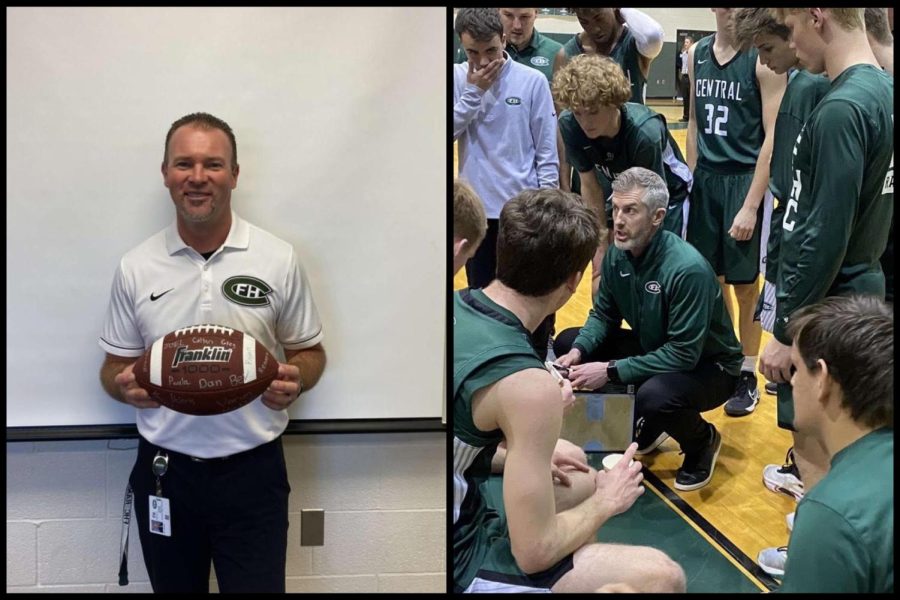Behind-the-scenes with the coaches of FHC

More stories from Olivia Oorbeck
Let’s state the obvious: athletes are necessary for us to enjoy watching sports. However, athletes are not the only ones needed for success in sports; coaches are also a key component. Without coaches, there would be no sport to play. At Forest Hills Central, both athletes and coaches put in a large amount of time and energy in order to attain success. Coaches devote countless hours and resources working with their teams and athletes. Most people do not realize the sacrifices a coach makes at all times of the season. Coaching is extremely taxing on a coach’s mental and physical health, and most times it is with little gratitude in return. However, a coach’s efforts can and often do inspire his or her athletes to achieve greatness and instill dedication.
Most people have had someone in their lives that they have admired, and often that someone is a coach. When you admire someone, he or she can leave a positive lasting impact and a desire to be like that person in life. Athletes who have admired coaches often gravitate toward becoming a coach or somehow instruct a sport later on. “Mark Tyler was the track coach that I looked up to,” Anthony Sultini, head boys freshman and JV football coach said. “His personality and his consistent availability to be there for any student and student-athlete really appealed to me. Even at the young stage of my life, I knew that I would later on want to do something in that realm.”
After taking that leap and deciding to coach, many have experienced the benefits of the profession. When I spoke to some of these athletes turned coaches, this is what they had to say. “It is rewarding and exciting to see the team have success,” Kyle Carhart, head coach of varsity boys basketball said. “It’s also positive to have a shared success, common goals, to work together, to think outside of themselves, and to really embrace the fact that it’s not only about the individual and to help guide them in that direction.”
Athletics can teach many lessons that may not be learned outside of sports, and quite often, these lessons derive from coaches. Athletes will often speak of their coaches’ abilities to inspire and impact others’ lives. Coaches, on the other hand, also benefit by witnessing all of the hard work and growth their athletes experience, including watching an athlete or team of athletes being shaped into better versions of themselves.
Coaching is incredibly rewarding, but it can also have its downsides. The harsh reality of athletics and team sports is that it consumes a huge portion of life. Fans come to the game and see the finished product during the competition, but what what they do not see are all of the behind-the-scenes work that leads to game day. To name a few, coaches spend countless hours planning practices, scouting the opponent either in-person or by watching film, planning the travel itinerary for away games, and often keeping an eye on the budgeting in order to provide the team with the proper equipment and apparel. This can take precious time away from the things that matter most, such as family life. “It is a very large time commitment for not only me but my family as well,” Carhart said. “The job needs a lot more responsibility and having children that demand a lot of attention, means that my wife is having to take care of the kids until I get back after school and practice.” Coach Sultini echoes coach Carhart’s sentiments by adding, “When I’m at practice, games, and team functions, that means that I’m not with my family and at their daily happenings. I miss out on many of my kids’ special events that I should probably be at. Since I coach two games on Thursday and one game on Friday, most weeks I don’t see my kids from Wednesday night until Saturday morning. It’s tough for me but quite possibly more tough on them and my wife.”
Coaching not only causes a large-time constraint on family and home life, but it can also have a significant impact on a person’s health, both physically and mentally. Due to lack of time, coaches often are not able to take care of themselves. They often are busy coaching and do not have as much time to exercise or eat well themselves. As coaches get older, their bodies continue to age, making it more difficult to do the same activities that they were able to do when they were younger inside and outside of practices. “Partaking in some of the drills or even weightlifting with the guys often times leads to being sore the next day,” Sultini humorously said. “It can also take a toll on my mental health because it is draining. After all of the prep-work leading up to the games is over, then you go into the stresses of the actual game. Win or lose, after the game is over, you almost immediately begin watching new film to prep for the next opponent the following week.”
Even with all of the downsides, there are many more upsides to coaching. One of these includes the lessons these coaches have learned along the way. These lessons not only include how to become a better coach, but they are also learning leadership lessons that they are able to incorporate into everyday life. Carhart adds that he learns the ability to “…think outside of yourself, while also being able to plan and prepare for what is to come,” He went on to further talk about “…being able to understand that there are innumerable things that you can’t prepare for, but that it is important to react to them in the right way and embrace new things and challenges in a positive way.” As you can see, athletics isn’t just about having fun; it’s a way to learn life skills. One thing is for sure, with the right coach you can learn a lot, and often those lessons can change the direction of your life.

Olivia Oorbeck is a senior on the FHC Sports Report. She is excited about entering her second and final year on the staff. This year, she received the...



